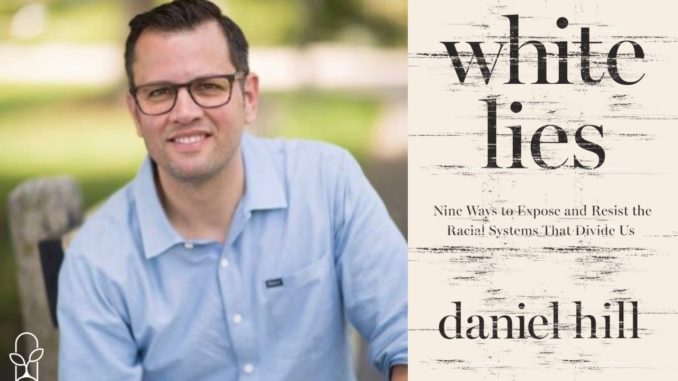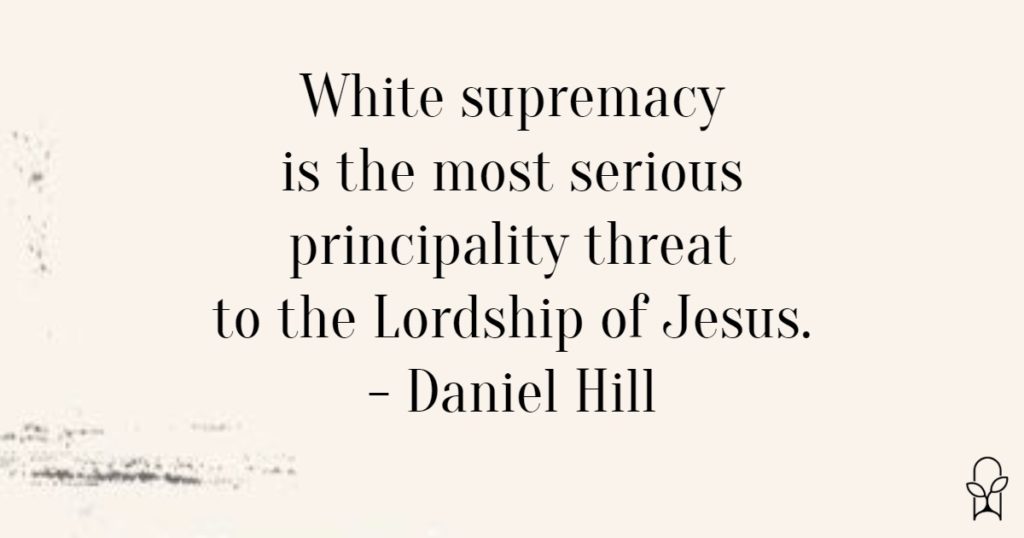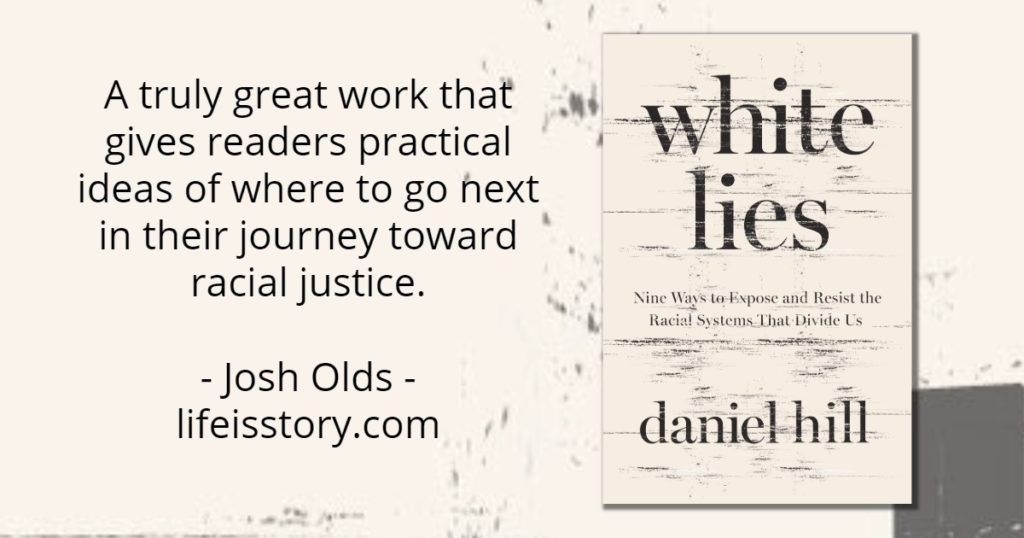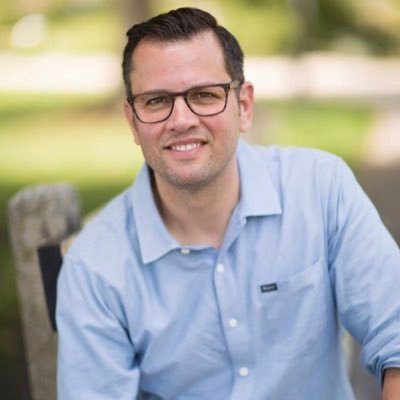
Podcast (beyond-the-page): Play in new window | Download
Subscribe: Apple Podcasts | RSS
I’ve had a lot of conversations this year about racial justice. Particularly in the wake of George Floyd’s murder, the white evangelicals I know have found themselves increasingly uncomfortable but unsure of how to proceed. White Lies gives them the answer. Despite the provocative title, Daniel Hill’s nine practices for exposing and resisting the structures that uphold White supremacy are clear, empathetic, and grace-filled. It is the perfect book for White evangelical Christians who are beginning their journey toward racial justice but want a firm, Biblically-backed foundation for doing so from a leader whose background and experiences mirror their own. I was halfway into the first chapter when I knew I needed to talk to Daniel about White Lies and our conversation did not disappoint.
The Interview | Daniel Hill
This excerpt has been lightly edited for brevity and clarity. You can listen to the full interview by clicking the play button above or subscribing to “Beyond the Page” at Apple Podcasts, Stitcher, Spotify, or wherever you listen to podcasts.
Josh Olds: Now, I want to start with this: You’re White; I’m white—we’re having this conversation about racial justice. And there can be a real tendency, and you talk about this in the book, in the “woke” white community to sort of talk over Black and other minority voices as we pursue justice. What ground rules should be set as White people when we have this conversation with other White people to make sure that we are allowing for BIPOC voices to be heard?
Daniel Hill: Yeah, thank you. I think it’s smart to start there. I definitely wouldn’t say it’s one or the other. There’s a role for both, right? And I think ultimately, you, me, all of us should be learning from credible, seasoned voices of color that have been doing this work. And when we’re talking about the system of race and white supremacy in particular, you know, nobody is going to see it more clearly than those who are disaffected. So there’s not any point in the journey where that we should not be listening to and learning from seasoned voices of color in this period. There’s no question about that.
I think what history continues to show is that even when they speak to us, we’re just not listening clearly enough, right? We’re just not making enough changes. And so, I think there’s an important role for White folks to be doing self-interrogation, you know, around their own kind of relationship and complicity with this. And so that’s what I would see what we’re doing, right? We’re not even taking somebody’s spot as much as saying, we’re listening to the collective wisdom is out there.

Josh Olds: The very first point you make in the book is the danger of being woke. And we have to define that phrase first. So, how do you define the word “woke?” And what do you feel is the danger of white people feeling that way?
Daniel Hill: Yeah, that was the trickiest title of any of them. because not a lot of people are doing this work. A lot of people don’t love the word “woke.” And so I don’t want to get fixated on the word itself. But I’d say in general, there’s two different profiles where white folks are at with this word. One is the much more common one where there’s just a lack of awakening, a lack of engagement, a lack of taking it seriously, you know, there’s kind of an ongoing indifference and apathy that has to be challenged. And then there’s another group that’s probably more represented by you and I who have begun to see that there’s a problem and want to be doing something about it. This is where the notion of wokeness kind of comes from and the way the term is usually used, when white people are speaking of it, is to be basically aware of the issues and be on the right side of the issues and down with the right causes. What it’s communicating is kind of an arrival point of enlightenment where. You know, “I’m not on the bad side of this, like all those people that I would point to.” Any sense of arriving, any sense of a destination, a sense of looking for a fixed state of enlightenment, any sense of trying to kind of prove to people of color or to other white people or even to ourselves that we’ve “arrived.”
Josh Olds: It’s very hard. Because I know I speak as a pastor, and you’re a pastor: We’re used to these positions of authority, particularly positions of authority where we use our voice to speak out. And it can be very easy for us to use the platform that we have, the gifting that we have, the calling that we have to, to raise awareness about this issue. And we can dive in too deep without really understanding the context, or understanding how taking over the conversation can be harmful.
I have seen people that are beginning this work fall into the trap of: They read a book, and they think that they’re the authority, and they no longer want to listen, or grow by listening to the voices of our Black brothers and sisters, minority brothers and sisters. What were some mistakes that you made early on in your journey that you see people making now and you’re like, you know, we don’t have to make these mistakes…learn from the people that have gone before you.
Daniel Hill: Yeah, essentially, you just used a metaphor I’ve never used but I think it could apply here. You’re talking about how we’re pastors. And, you know, there’s almost this danger of, you know, seeing the authority that might come with that and applying that, but essentially, not maybe a bad metaphor for how to think of what the journey should be, right?
And if we thought of this process of going from becoming a Christian to becoming a pastor, so to speak, right, you wouldn’t have somebody who got converted on Monday and then assign them to pastor church by Friday. We understand there’s a long process of becoming somebody who understands their own sin and our own desires, how to, like, engage in the classic spiritual disciplines and how to grow spiritually. And then even when we are do become pastors, we need to be formally trained, we need to be accredited, we need to have groups to kind of recognize that, right? That’s not actually a bad analogy to where it goes wrong and where it goes right.
It’s not to say that there can’t be some substantial roles of White folks playing in this, but there’s a lot—a lot, a lot, a lot—of seasoning that has to happen before that. And there needs to be established leaders of color, who kind of say, “Here’s the White person who’s done the work. We validate the way they see this”…
The answer is to not take on an immediate leadership role, to try to move from ignorance and apathy to like, suddenly trying to be the one to lead the charge, right? leadership is probably the big piece here. Right? It’s, there’s very little risk with being actively involved under the leadership of established leaders of color in this, when as White folks, we try to take the lead on solving a problem that is generations in the making, which we are blind to until two weeks ago, that’s probably where the risk level becomes really high.
The Book | White Lies

What can you do to be a force for racial justice?
Many White Christians are eager to fight against racism and for racial justice. But what steps can they take to make good, lasting change? How can they get involved without unintentionally doing more harm than good?
In this practical and illuminating guide drawn from more than twenty years of cross-cultural work and learning from some of the greatest leaders of color, pastor and racial justice advocate Daniel Hill provides nine practices rooted in Scripture that will position you to be an active supporter of inclusion, equality, and racial justice. With stories, studies, and examples from his own journey, Hill will show you:
- How to get free of the impact of White supremacy individually and recognize that it works systemically
- How to talk about race in an intelligent and respectful way
- How to recognize which strategies are helpful and which are harmful
- What you can do to make a difference every day, after protests and major events
We cannot experience wholistic justice without confronting and dismantling White supremacy. But as we follow Jesus—the one who is supreme over all things—into overturning false power systems, we will become better advocates of the liberating and unconditional love that God extends to us all.
The Author | Daniel Hill
 Daniel Hill is the author of “White Lies,” “White Awake,” and “10:10: Life to the Fullest,” and is the Founding and Senior Pastor of River City Community Church, located in the west Humboldt Park neighborhood of Chicago. The vision of River City is centered on the core values of worship, reconciliation, and neighborhood development. Formed in 2003, River City longs to see increased spiritual renewal as well as social and economic justice in the Humboldt Park neighborhood and entire city, demonstrating compassion and alleviating poverty as tangible expressions of the Kingdom of God.
Daniel Hill is the author of “White Lies,” “White Awake,” and “10:10: Life to the Fullest,” and is the Founding and Senior Pastor of River City Community Church, located in the west Humboldt Park neighborhood of Chicago. The vision of River City is centered on the core values of worship, reconciliation, and neighborhood development. Formed in 2003, River City longs to see increased spiritual renewal as well as social and economic justice in the Humboldt Park neighborhood and entire city, demonstrating compassion and alleviating poverty as tangible expressions of the Kingdom of God.
Prior to starting River City, Daniel launched a dot.com in the 90’s before serving 5 years on the staff of Willow Creek Community Church in the suburbs of Chicago. Daniel has his B.S. in Business from Purdue University, his M.A. in Theology from Moody Bible Institute, his certificate in Church-based Community and Economic Development from Harvard Divinity School, and his D.Min. from Northern Baptist Theological Seminary. Daniel is married to Elizabeth, who is a Professor of Psychology, and they are the proud parents of Xander and Gabriella Hill.
